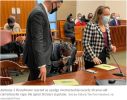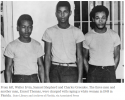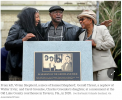Purple and Black
Taking Independent and Unofficial Back
Taking Independent and Unofficial Back
You are using an out of date browser. It may not display this or other websites correctly.
You should upgrade or use an alternative browser.
You should upgrade or use an alternative browser.
BLM
- Thread starter barnswallow
- Start date
barnswallow
Well-Known Member
The verdicts in the Ahmaud Aubrey murder trial were announced on Wednesday 11.24.2021.
Father of Ahmaud Arbery escorted after following outburst during murder verdict [First Coast News, WFAA-8 ABC;11.24.21]
Although it has a strangely worded headline, this article lists all the counts and the verdict for each for each of the 3 on trial.



Ahmaud Arbery was murdered 23 February 2020.
Justice Was Almost Not Served In This Case [TPM;11.24.21]
Reminder: There Was Only One Person Of Color On This Jury [TPM;11.24.21]
Ahmaud Arbery's Final Minutes: What 911 Calls and Video Show [NYTimes;5.16.20]
trying another link
Now, the defendants face federal charges:
Reminder: All Three Convicted Defendants Also Face Federal Hate Crime Charges [TPM;11.24.21]
Travis And Greg McMichael, William 'Roddie' Bryan Guilty Of Murdering Ahmaud Arbery [TPM;11.24.21]
I read another NYTimes article about the prosecutor in the case.
How a Proseutor Addressed a Mostly White Jury and Won a Conviction in the Arbery Case [NYTimes;11.25.21]
"Linda Dunikoski, a prosecutor brought in from the Atlanta area, struck a careful tone in a case that many saw as an obvious act of racial violence."
Father of Ahmaud Arbery escorted after following outburst during murder verdict [First Coast News, WFAA-8 ABC;11.24.21]
Although it has a strangely worded headline, this article lists all the counts and the verdict for each for each of the 3 on trial.



Ahmaud Arbery was murdered 23 February 2020.
Before that, the district attorney at the time actively tried to bury the case.The three men weren't arrested until May 2020, after the release of cellphone video of the fatal shooting was leaked to the media.
Justice Was Almost Not Served In This Case [TPM;11.24.21]
In a county where the ethnicity is ~25% Black,One former prosecutor on the case has since been indicted for allegedly using her position to discourage police from making arrests after Arbery’s murder. Another district attorney on the case took more than a month to reveal his conflicts of interest in the case, and called the shooting “justifiable.”
Travis McMichael, Greg McMichael and William Bryan weren’t even charged in the killing for over two months, after the video of the slaying went viral online, sparking protests and nationwide outcry.
Reminder: There Was Only One Person Of Color On This Jury [TPM;11.24.21]
Here is a link to upsetting video of what happened that day, probably behind a paywall.This was an issue the prosecution raised at the beginning of the trial arguing that the defense dismissed a number of potential Black jurors because of their race.
Ahmaud Arbery's Final Minutes: What 911 Calls and Video Show [NYTimes;5.16.20]
trying another link
Now, the defendants face federal charges:
Reminder: All Three Convicted Defendants Also Face Federal Hate Crime Charges [TPM;11.24.21]
All the TPM links I post above are collected in a string of short articles linked to below, which has additional reporting you might want to check out.Last spring, the Justice Department charged each of the defendants with interfering with Arbery’s right to use a public street due to his “race and color,” in addition to attempted kidnapping.
The McMichaels were also federally charged with using, carrying and brandishing a firearm, with Travis accused of shooting Arbery.
The defendants did not face hate-crime charges at the state level because no such law existed in Georgia at the time of Arbery’s death. However, Arbery’s death prompted both Republican and Democratic state lawmakers to work together to revive and pass a new hate-crime law.
Travis And Greg McMichael, William 'Roddie' Bryan Guilty Of Murdering Ahmaud Arbery [TPM;11.24.21]
I read another NYTimes article about the prosecutor in the case.
How a Proseutor Addressed a Mostly White Jury and Won a Conviction in the Arbery Case [NYTimes;11.25.21]
"Linda Dunikoski, a prosecutor brought in from the Atlanta area, struck a careful tone in a case that many saw as an obvious act of racial violence."
...Despite the evidence of racism she had at her disposal, Linda Dunikoski, the prosecutor, stunned some legal observers by largely avoiding race during the trial, choosing instead to hew closely to the details of how the three men had chased the Black man, Ahmaud Arbery, through their neighborhood.
The risks went beyond her career and a single trial. Failure to convict in a case that many saw as an obvious act of racial violence would reverberate well outside Glynn County, Ga. For some, it would be a referendum on a country that appeared to have made tentative steps last summer toward confronting racism, only to devolve into deeper divisions.
...A number of legal experts, in the moment, thought Ms. Dunikoski’s strategy to be a risky one. But many in Brunswick thought that she had proved savvy about what tone to strike in a Deep South community where, they said, race doesn’t have to be referenced explicitly for everyone to understand the implications.
Cedric King, a Black local businessman, said that the evidence against the defendants, particularly the video of Mr. Arbery’s murder, had been strong enough to stand on its own.
...The case took a tortuous route before landing in Ms. Dunikowski’s lap. Two local district attorney’s offices handled the case to begin with, but both eventually removed themselves from it, citing conflicts of interest; one of the former prosecutors, Jackie Johnson, has been criminally indicted over her handling of the case. It was in the hands of a third D.A.’s office before being passed to the more resource-rich Cobb County, where Ms. Dunikoski has worked since 2019.
She led the jury through a thicket of detailed legal points as she pushed back against the defense’s argument that the three white men had pursued Mr. Arbery legally, under a state citizen’s arrest law that has since been largely gutted. And she sought to dismantle the idea that the man who pulled the trigger, Travis McMichael, had done so in self-defense.
In her rebuttal to the defense’s closing argument — the last word before jurors were sent off to decide the fate of the three men — Ms. Dunikoski made an appeal to common sense, offering up a general rule of life that she said the defendants had violated: “Don’t go looking for trouble.”
She had already told them that Mr. Arbery was killed because he was Black. Now she was telling them that the case wasn’t about whether the men were “good or bad people.” Rather, she said, it was “about holding people accountable and responsible for their actions.”
Last edited:
maplenpg
Well-Known Member
The right verdict. I didn't know about the prosecutor avoiding discussion on race for the most part so thank you for posting. That was really interesting.The verdicts in the Ahmaud Aubrey murder trial were announced on Wednesday 11.24.2021.
Father of Ahmaud Arbery escorted after following outburst during murder verdict [First Coast News, WFAA-8 ABC;11.24.21]
Although it has a strangely worded headline, this article lists all the counts and the verdict for each for each of the 3 on trial.
View attachment 1047View attachment 1048View attachment 1049
Ahmaud Arbery was murdered 23 February 2020.
Before that, the district attorney at the time actively tried to bury the case.
Justice Was Almost Not Served In This Case [TPM;11.24.21]
In a county where the ethnicity is ~25% Black,
Reminder: There Was Only One Person Of Color On This Jury [TPM;11.24.21]
Here is a link to upsetting video of what happened that day, probably behind a paywall.
Ahmaud Arbery's Final Minutes: What 911 Calls and Video Show [NYTimes;5.16.20]
trying another link
Now, the defendants face federal charges:
Reminder: All Three Convicted Defendants Also Face Federal Hate Crime Charges [TPM;11.24.21]
All the TPM links I post above are collected in a string of short articles linked to below, which has additional reporting you might want to check out.
Travis And Greg McMichael, William 'Roddie' Bryan Guilty Of Murdering Ahmaud Arbery [TPM;11.24.21]
I read another NYTimes article about the prosecutor in the case.
How a Proseutor Addressed a Mostly White Jury and Won a Conviction in the Arbery Case [NYTimes;11.25.21]
"Linda Dunikoski, a prosecutor brought in from the Atlanta area, struck a careful tone in a case that many saw as an obvious act of racial violence."
...
...
...
benni
Well-Known Member

John Lundun: "This photo was taken at a Greensboro, North Carolina Black Lives Matter March. The little girl wanted to take part so she ran to the front and grabbed the hand of one of the organizers all on her own. This is a great photo, it screams volumes about children and hate."
And you all know that there are many white women and men who would take one look at that black man and think "Oh, scary black man! He must be a criminal!" And that little girl, who wanted to be a part of the march, looked at him and thought, "Nice man, someone I can trust." This is a prime example that children are taught to hate. And I love the pure joy on that little girl's face and how attentive he is to her. I just know that if anything were to happen, he'd protect that little girl. This is what it is all about. This picture is so powerful to me.
barnswallow
Well-Known Member
In the last week or so, the NYTimes has reported on several cases of Black people who were convicted of crimes they did not commit and who have finally, in this past week or so, been exonerated / released. Here's one in a list of the cases I saw:
Man Is Exonerated in Rape Case Described in Alice Sebold's Memoir [NYTimes;11.23.21]

Man Is Exonerated in Rape Case Described in Alice Sebold's Memoir [NYTimes;11.23.21]

...The rape took place in a Syracuse, N.Y., park in 1981 and was described in raw detail in a memoir published nearly 20 years after it occurred, as the man convicted of the crime struggled to rebuild his life after his release from prison.
The book, titled “Lucky,” launched the career of the author Alice Sebold, who later rose to international fame with “The Lovely Bones,” a novel that also centers on sexual assault and sold millions of copies.
The man who was convicted of the attack, Anthony J. Broadwater, had always maintained he was innocent. On Monday, he was exonerated, as a state judge, his defense lawyers and the Onondaga County district attorney agreed that the case against him had been woefully flawed.
“It’s a long day coming,” Mr. Broadwater, 61, said in an interview on Tuesday, recalling the years of stigma and isolation he faced as a registered sex offender.
He got married and sought work after spending 16 years in prison, but found himself cut off from opportunities because of the conviction.
“On my two hands, I can count the people that allowed me to grace their homes and dinners, and I don’t get past 10,” he said. “That’s very traumatic to me.”
...After evidence was collected from a rape kit, she described her assailant’s features to the police, but the resulting composite sketch didn’t resemble him, she wrote.
Mr. Broadwater was arrested five months later, after Ms. Sebold passed him on the street and contacted the police, saying she may have seen her attacker.
...But she identified a different man as her attacker in a police lineup. In her memoir, she writes that Mr. Broadwater and the man next to him looked alike and that moments after she made her choice, she felt she had picked the wrong man. She later identified Mr. Broadwater in court.
...In their motion to vacate the conviction, the defense lawyers J. David Hammond and Melissa K. Swartz wrote that the case had relied solely on Ms. Sebold’s identification of Mr. Broadwater in the courtroom and a now-discredited method of microscopic hair analysis.
They also argued that prosecutorial misconduct was a factor during the police lineup — that the prosecutor had falsely told Ms. Sebold that Mr. Broadwater and the man next to him were friends who had purposely appeared in the lineup together to trick her — and that it had improperly influenced Ms. Sebold’s later testimony.
...A planned film adaptation of “Lucky” played a role in raising doubts about the case against Mr. Broadwater.
Timothy Mucciante was working as executive producer of the adaptation of “Lucky,” but began to question the story that the movie was based on earlier this year, after he noticed discrepancies between the memoir and the script.
“I started having some doubts, not about the story that Alice told about her assault, which was tragic, but the second part of her book about the trial, which didn’t hang together,” Mr. Mucciante said in an interview.
Mr. Mucciante said that he ended up leaving the production in June because of his skepticism about the case and how it was being portrayed.
Mr. Broadwater, who was released in 1998, had been scrimping and saving to hire lawyer after lawyer to try and prove his innocence.
He said that he and his wife, Elizabeth, had wanted to have children, but he felt they could not given the stigma of his conviction.
Mr. Broadwater recalled that he had just returned home to Syracuse from a stint serving in the Marine Corps in California when he was arrested. He was 20 years old at the time.
He had gone home because his father was ill, he said. His father’s health worsened during the trial, and he died shortly after Mr. Broadwater was sent to prison.
“I just hope and pray that maybe Ms. Sebold will come forward and say, ‘Hey, I made a grave mistake,’ and give me an apology,” Mr. Broadwater said.
“I sympathize with her,” he said. “But she was wrong.”
barnswallow
Well-Known Member
Another case which has a long, sordid history: the Groveland Four.
Just this week:
Four Black Men Wrongly Charged With Rape Are Exonerated 72 Years Later [NYTimes;11.22.21]


Or,
White supremacist prison guards work with impunity in Florida [AP;11.19.21]
Briefly, back to the case of the Greenland Four. In early January 2019, Ron DeSantis, governor of Florida, pardoned them. Grudgingly, giving him credit. Or, was it a political move?
Here's a link to the NYTimes article: Florida Pardons the Groveland Four, 70 Years After Jim Crow-Era Rape Case [NYTimes;1.11.19]
Just this week:
Four Black Men Wrongly Charged With Rape Are Exonerated 72 Years Later [NYTimes;11.22.21]
Four Black men wrongly charged with raping a white woman more than 70 years ago in Florida were exonerated on Monday, bringing an end to a saga that has shadowed their families for decades.
The accused — Charles Greenlee, Walter Irvin, Samuel Shepherd and Ernest Thomas, known as the Groveland Four — died before Florida officials re-examined the case, which a prosecutor said lacked due process and would not be tried today.
It all began on July 16, 1949, when a 17-year-old white woman and her estranged husband told the police that after their car broke down in Lake County, Fla., the four men had stopped to provide help, then took the woman from the car and raped her.
The accusation left a trail of destruction. Mr. Thomas was killed by a mob after fleeing Lake County. Mr. Irvin and Mr. Shepherd, both of whom were World War II veterans, were shot by Willis McCall, the Lake County Sheriff, while they were being taken to a pretrial hearing before their cases were retried in 1951. The sheriff claimed that the men, who were in handcuffs, had tried to escape.
Mr. Shepherd died and Mr. Irvin pretended to be dead and survived. Mr. Irvin later provided crucial testimony about the events that led up to the shooting. He died in 1969, a year after he was granted parole. Mr. Greenlee, who was 16 when he was charged, was the only one to survive past 1969. He died in 2012, at 78.


...Carol Greenlee, the daughter of Mr. Greenlee, said she had been seeking her father’s exoneration since the late 1960s, even though he forbid her to do it because the case was so painful for him. Ms. Greenlee, 72, said the court’s ruling was the end “of feeling that nobody is listening, that you are inside a prison of your own that you need to break out but you don’t know how because all the doors are locked.”
...In August, investigators spoke with a grandson of Jesse Hunter, the state attorney who prosecuted the case. Broward Hunter said he found correspondence in his grandfather’s law office that convinced him that Jesse Hunter and the judge presiding over the retrial knew that no rape had occurred.
...While families of the accused were haunted by the case for decades, it took two books to spur a re-examination: “Legal Lynching: The Sad Saga of the Groveland Four,” by Gary Corsair, published in 2004, and “Devil in the Grove: Thurgood Marshall, the Groveland Boys, and the Dawn of a New America,” by Gilbert King, which won a Pulitzer Prize after it was published in 2012.
In April 2017, the state of Florida formally apologized to the families of the four men. In December 2018, the Department of Law Enforcement was ordered to review the case. The four men were pardoned by Gov. Ron DeSantis in January 2019.
At the time of the pardon, Norma Padgett, the woman who said she was raped, testified at a clemency board hearing that she did not want them pardoned. She could not be reached for comment on Monday.
Hold up there. Trayvon Martin?In October, Mr. Gladson filed a motion to clear all four men of the charges.
He wrote in his motion that today, no “fair-minded” prosecutor would even consider filing the charges and that “the evidence strongly suggests that the sheriff, the judge and the prosecutor all but ensured guilty verdicts in this case.”
“These officials, disguised as keepers of the peace and masquerading as ministers of justice, disregarded their oaths, and set in motion a series of events that forever destroyed these men, their families and a community,” Mr. Gladson wrote. “I have not witnessed a more complete breakdown of the criminal justice system, nor do I ever expect I will again.”
Or,
White supremacist prison guards work with impunity in Florida [AP;11.19.21]
I've no doubt those two examples barely scrape the surface.Some Florida prison guards openly tout associations with white supremacist groups to intimidate inmates and Black colleagues, a persistent practice that often goes unpunished, according to allegations in public documents and interviews with a dozen inmates and current and former employees in the nation’s third-largest prison system. Corrections officials regularly receive reports about guards’ membership in the Ku Klux Klan and criminal gangs, according to former prison inspectors, and current and former officers.
Still, few such cases are thoroughly investigated by state prison inspectors; many are downplayed by officers charged with policing their own or discarded as too complicated to pursue.
“I’ve visited more than 50 (prison) facilities and have seen that this is a pervasive problem that is not going away,” said Democratic Florida state Rep. Dianne Hart. “It’s partly due to our political climate. But, those who work in our prisons don’t seem to fear people knowing that they’re white supremacists.”
Briefly, back to the case of the Greenland Four. In early January 2019, Ron DeSantis, governor of Florida, pardoned them. Grudgingly, giving him credit. Or, was it a political move?
Here's a link to the NYTimes article: Florida Pardons the Groveland Four, 70 Years After Jim Crow-Era Rape Case [NYTimes;1.11.19]
barnswallow
Well-Known Member
DiminutiveRocker
Well-Known Member
It's always so disheartening to see injustices perpetrated not only in present time, but in the not so recent past to people who were doing nothing but providing joy through music.
DiminutiveRocker
Well-Known Member
| BREAKING NEWS |
A judge rejected a plea deal from one of the three white men facing federal hate-crimes charges for the killing of Ahmaud Arbery. |
| Monday, January 31, 2022 4:27 PM EST |
| The judge rejected the agreement that Travis McMichael had reached with the Department of Justice after strenuous opposition from Mr. Arbery’s family, who objected to the fact that it allowed Mr. McMichael to spend 30 years in federal prison, rather than in state prison. |
Travis McMichael, 36, and his father, Gregory McMichael, 66, had agreed to plead guilty, admitting for the first time that they had attacked Mr. Arbery because of his race.
But the judge rejected the agreements that the men had reached with the Department of Justice after strenuous opposition from Mr. Arbery’s family, who objected to the fact that it allowed them to spend 30 years in federal prison, rather than in state prison.
“I’m asking on the behalf of his family, on behalf of his memory and on behalf of fairness that you do not grant this plea in order to allow these men to transfer out of Georgia state custody into the federal prisons where they prefer to be,” Wanda Cooper-Jones, Mr. Arbery’s mother, told the judge.
poppy
Offending Member
Another larger photo. Dizzy Gillespie was there too, laughing and cutting up with the band.

maplenpg
Well-Known Member
Pardon my ignorance, but what's the difference between federal prison and state prison? i.e. why is it preferred?ATLANTA — A federal judge on Monday rejected plea deals from two of the three white men facing federal hate-crimes charges for the killing of Ahmaud Arbery, 25, the Black man who was chased through a Georgia neighborhood and fatally shot.
BREAKING NEWS A judge rejected a plea deal from one of the three white men facing federal hate-crimes charges for the killing of Ahmaud Arbery.
Monday, January 31, 2022 4:27 PM EST The judge rejected the agreement that Travis McMichael had reached with the Department of Justice after strenuous opposition from Mr. Arbery’s family, who objected to the fact that it allowed Mr. McMichael to spend 30 years in federal prison, rather than in state prison.
Travis McMichael, 36, and his father, Gregory McMichael, 66, had agreed to plead guilty, admitting for the first time that they had attacked Mr. Arbery because of his race.
But the judge rejected the agreements that the men had reached with the Department of Justice after strenuous opposition from Mr. Arbery’s family, who objected to the fact that it allowed them to spend 30 years in federal prison, rather than in state prison.
“I’m asking on the behalf of his family, on behalf of his memory and on behalf of fairness that you do not grant this plea in order to allow these men to transfer out of Georgia state custody into the federal prisons where they prefer to be,” Wanda Cooper-Jones, Mr. Arbery’s mother, told the judge.
DiminutiveRocker
Well-Known Member
No ignorance to pardon - had to research myself. Federal prisons tend to have higher security than state ones. Prisoners who have committed violent crimes are more likely to be in state prison. State prisons are often considered to be less safe than federal ones because more violent criminals live in them.Pardon my ignorance, but what's the difference between federal prison and state prison? i.e. why is it preferred?
maplenpg
Well-Known Member
Thanks Dimi, knowing how the prison hierarchy works, it's no wonder that he wants to go in the less violent one; though wherever they end up, they'll be targeted (rightly so).No ignorance to pardon - had to research myself. Federal prisons tend to have higher security than state ones. Prisoners who have committed violent crimes are more likely to be in state prison. State prisons are often considered to be less safe than federal ones because more violent criminals live in them.
barnswallow
Well-Known Member
I succumbed to the clickbait at Yahoo to read this article. The slayer is claiming self-defense. Of course, it's complicated by drugs and firearms. And, the fact that the victim (oh yeah, it won't be possible for lawyers to use that term, recalling the judge's rules in the Arberry case, lest the term color the opinion of the jury) -- the deceased -- has no one to speak for him. The death occurred 6 weeks ago. One reason given for the delay is a still-in-progress toxicology report. What about a toxicology report of the white people inside the cabin who were taken into custody and released the same day? Did they have blood samples taken? It is not being described as a 'hate crime'. We'll hear all about Peter Bernardo Spencer's failings in life. In any case, he was excited to be in the outdoors for a few days' vacation but within hours of his fiancé dropping him off at the cabin, he was dead. Without a vehicle, he couldn't have left, if he'd wanted to. Jamaican immigrant Peter Bernardo Spencer was killed on a cabin trip. His family vows to uncover the truth. [yahoo!news;1.31.22] There've been many incidents of odd white-on-black crimes since the last post in this thread on the topic. It's overwhelming to try to record them all. I have a feeling this case here will leak like a sieve and that we'll be left with the nagging sensation that something deeply wrong happened, and no way of proving it. Likely, there's no video of this incident.
barnswallow
Well-Known Member
Amir Locke, killed by Minneapolis cop, wanted music career [Associated Press;2.5.22]
Sickening. Somebody, make it stop. Media objecting to the mere mention of 'police reform', cut it out. Recently, my friend who likes to read the W--- St---- J------, spoke about a new campaign to report about police killed in the line-of-duty, a both-sides-ism effort, in a time we need to confront a completely lop-sided disaster of law enforcement.
We don't know all the details. The warrant had something to do with an ongoing homicide investigation and so, its claimed, it must remain under wraps. Is there anything that could come out about this that would exonerate this crime against humanity? A pathetic explanation will be pedaled into public view that will look like a justification. 3... 2... 1...
Sickening. Somebody, make it stop. Media objecting to the mere mention of 'police reform', cut it out. Recently, my friend who likes to read the W--- St---- J------, spoke about a new campaign to report about police killed in the line-of-duty, a both-sides-ism effort, in a time we need to confront a completely lop-sided disaster of law enforcement.
We don't know all the details. The warrant had something to do with an ongoing homicide investigation and so, its claimed, it must remain under wraps. Is there anything that could come out about this that would exonerate this crime against humanity? A pathetic explanation will be pedaled into public view that will look like a justification. 3... 2... 1...
poppy
Offending Member
^ Forget about "sides". All you have to do is watch the video. The cops came in silently using a key, and murdered that poor man - (lying down holding a legal gun) - in 7 seconds. That shit was approved by a judge, see below. Even fox news reported that.
(FOX 9) - The Minneapolis SWAT team that carried out a no-knock search warrant that led to the police killing of Amir Locke did so at 6:48 a.m. Wednesday, twelve minutes before Minnesota law says such warrants can be executed unless a nighttime search is deemed necessary.
The law, passed after intense negotiation in summer 2021, allows no-knock warrants between 7 a.m. and 8 p.m. It also allows judges to approve nighttime searches if "necessary to prevent the loss, destruction, or removal of the objects of the search or to protect the searchers or the public." Police must outline in their search warrant application why an overnight search is required.
(FOX 9) - The Minneapolis SWAT team that carried out a no-knock search warrant that led to the police killing of Amir Locke did so at 6:48 a.m. Wednesday, twelve minutes before Minnesota law says such warrants can be executed unless a nighttime search is deemed necessary.
The law, passed after intense negotiation in summer 2021, allows no-knock warrants between 7 a.m. and 8 p.m. It also allows judges to approve nighttime searches if "necessary to prevent the loss, destruction, or removal of the objects of the search or to protect the searchers or the public." Police must outline in their search warrant application why an overnight search is required.
benni
Well-Known Member
Wasn't sure where to put this article, because it touches on a key point that I'd like to share here, but is mainly about the Republican efforts to overturn the election and the Jan. 6 committee. This statement stood out to me:
Republican political operative Stephen K. Bannon told Politico that enflaming racism was how Republicans would take back Congress. “I see 50 [House Republican] seats in 2022. Keep this up,” he said. “I think you’re going to see a lot more emphasis from Trump on [CRT] and DeSantis and others. People who are serious in 2024 and beyond are going to focus on it.” https://heathercoxrichardson.substack.com/p/february-9-2022
Republican political operative Stephen K. Bannon told Politico that enflaming racism was how Republicans would take back Congress. “I see 50 [House Republican] seats in 2022. Keep this up,” he said. “I think you’re going to see a lot more emphasis from Trump on [CRT] and DeSantis and others. People who are serious in 2024 and beyond are going to focus on it.” https://heathercoxrichardson.substack.com/p/february-9-2022
poppy
Offending Member
Well, De Santis et al just pulled this shit yesterday. Guess if you're black and lgbtq+ that makes you a double winner.Wasn't sure where to put this article, because it touches on a key point that I'd like to share here, but is mainly about the Republican efforts to overturn the election and the Jan. 6 committee. This statement stood out to me:
Republican political operative Stephen K. Bannon told Politico that enflaming racism was how Republicans would take back Congress. “I see 50 [House Republican] seats in 2022. Keep this up,” he said. “I think you’re going to see a lot more emphasis from Trump on [CRT] and DeSantis and others. People who are serious in 2024 and beyond are going to focus on it.” https://heathercoxrichardson.substack.com/p/february-9-2022
(CNN) Florida Gov. Ron DeSantis appeared Monday to voice support for a controversial state bill that would ban certain discussions about sexual orientation and gender identity in the classroom. aka - 'Don't say gay'